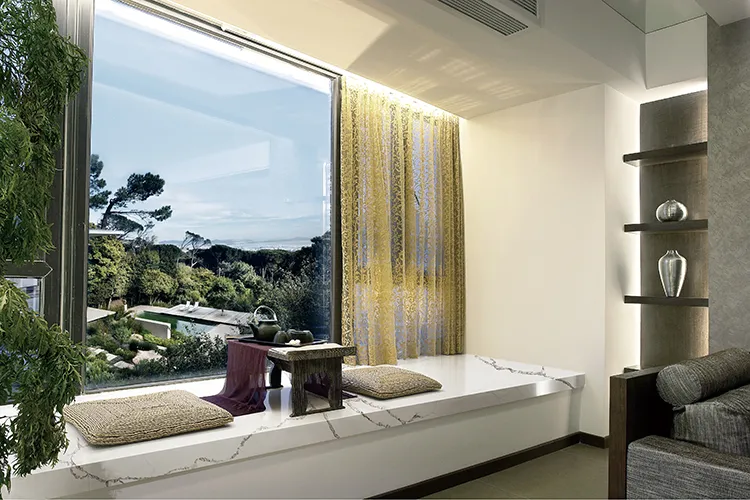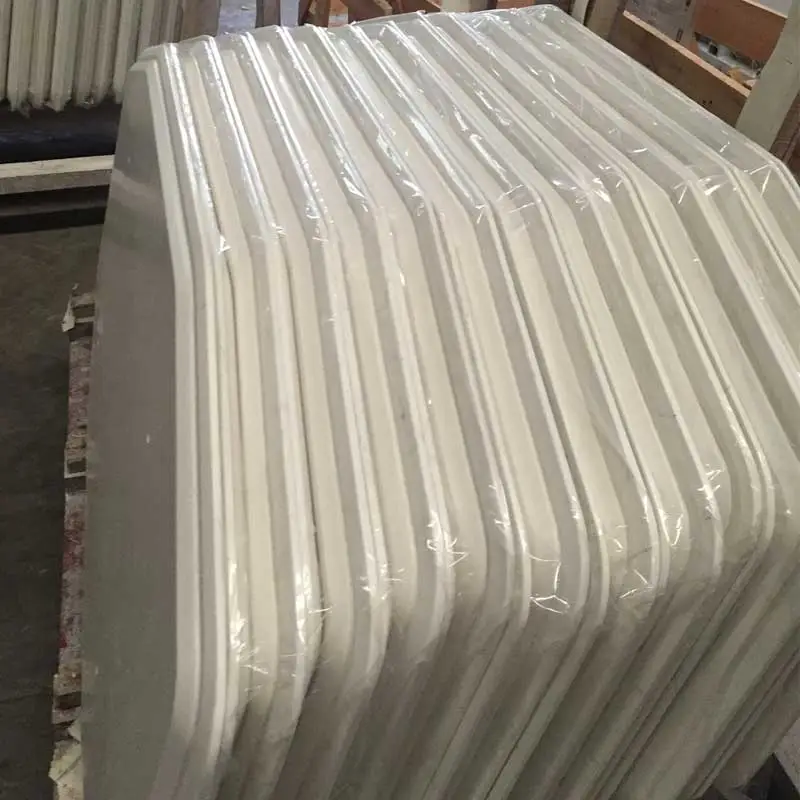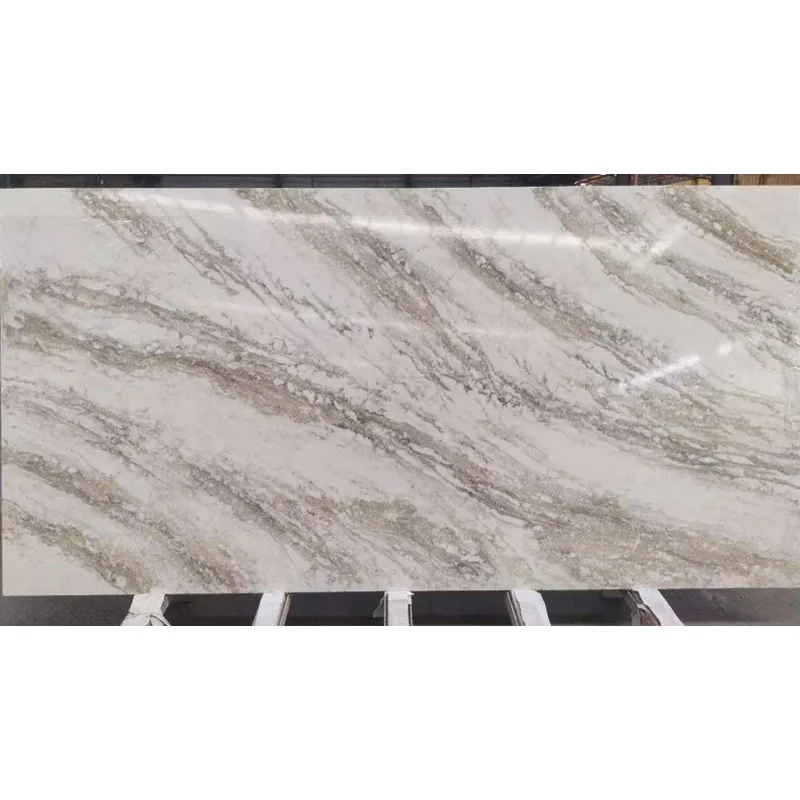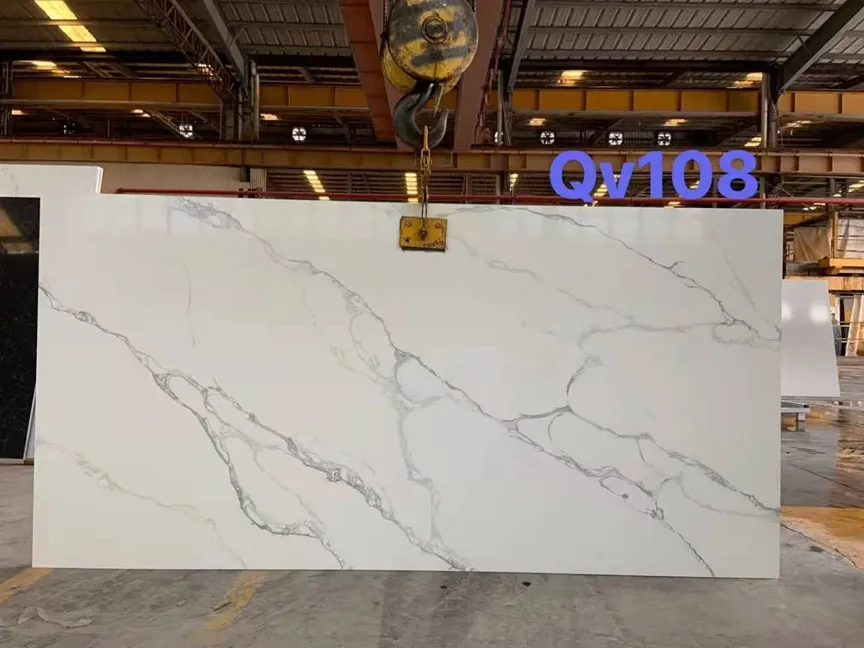Whether used as a decorative panel under the TV background wall, a storage platform, or as a coffee table top or bar countertop structural surface material, quartz stone benchtops are favored for their high hardness, beauty and durability.
However, in the actual purchase and installation process, "How thick should the quartz stone benchtop be?" This question is often overlooked, especially for living room scenes. Quartz stone countertops of different thicknesses not only affect the structural strength and safety of use, but also the overall aesthetics, installation method, and the convenience of later maintenance.
Therefore, this article will conduct an in-depth analysis on the topic of "What is the best thickness of a quartz stone benchtop for the living room".

Quartz stone countertop structural foundation: Why is thickness so important?
"Thickness" in quartz stone benchtops is far more than just a size parameter. It is closely related to the following key performances:
· Structural load-bearing capacity: The greater the thickness, the stronger the ability to resist bending, cracking, and breaking;
· Installation method selection: Different thicknesses have different requirements for supporting structures and installation methods;
· Processing and transportation difficulty: Too thick or too thin will affect the handling, cutting, and edge grinding process;
· Visual beauty and design coordination: Thickness affects the coordination of decorative proportions and the presentation of texture;
· Material cost control: The greater the thickness, the more consumables, and the cost will rise accordingly.
Therefore, in living room applications, choosing the appropriate thickness of quartz stone benchtops is the key to taking into account performance, beauty, and economy.
Analysis of common thickness specifications of quartz stone countertops
Currently, there are several common thickness specifications of quartz stone countertops on the market, and each thickness is suitable for different scene requirements.
| Thickness (mm) | Description | Application scenarios |
| 12mm | The thinnest model, with low structural strength | Wall decoration, vertical paving, background wall material |
| 15mm | Both aesthetics and lightness | Medium decorative surface, coffee table, small cabinet surface |
| 18mm | Standard thickness for home use | Conventional kitchen countertop, living room storage platform |
| 20mm | Standard for mid- to high-end thick panels | Bar countertop, living room table, display platform |
| 30mm | Extra thick model, with strong load-bearing capacity | Commercial heavy-duty countertop, carved countertop |
Understanding these basic thickness specifications is the premise for further discussion of "the best thickness of quartz stone countertops in the living room".

Five factors that affect the thickness selection of quartz stone countertops in the living room
Before determining the optimal thickness, the function and design logic behind the thickness selection must be clear. The following five factors directly affect the thickness orientation of quartz stone countertops in the living room:
1. Functional use
Quartz stone benchtops have many uses in the living room, including but not limited to:
·Coffee table tops: need to be wear-resistant and pressure-resistant, requiring a certain thickness;
·TV cabinet tops: strong decorativeness, general load-bearing requirements;
·Fireplace decorative surface: high heat resistance requirements, thickness needs to match the installation structure;
·Bar or island: often in contact with heavy objects, need to have high strength;
·Window sill countertops or storage tables: can take into account both beauty and portability.
Different uses have different requirements for thickness, which need to be accurately matched according to the function.
2. Support structure strength
The quartz stone benchtop itself is heavy, and too thin is prone to insufficient support and causes:
·Cracks in corners;
·Local deformation;
·Long-term bending and instability.
Therefore, the thickness should be selected by comprehensively considering the type of mounting bracket (such as steel frame, wooden cabinet, brick structure).
3. Visual proportion coordination
The thickness also directly affects the visual performance of the countertop. A too thin quartz stone countertop looks cheap and lacks thickness; while a too thick one is easy to compress the sense of space and cause visual burden. Therefore, it should be coordinated with the furniture, background, and overall proportion of the space.
4. Construction and processing feasibility
The greater the thickness, the more complicated the processing, the more difficult the transportation, and the higher the labor cost. Especially in family homes or fine-decorated houses with higher floors, it is necessary to consider both construction feasibility and later installation convenience.
5. Material cost budget
Although the price of quartz stone countertops is mainly determined by brand, material and color, thickness also significantly affects the overall cost. For every 1 mm increase in thickness, the average cost increases by 5%~10%. Therefore, the thickness should be controlled while ensuring performance, so as to optimize the budget.

Performance comparison of quartz stone benchtops of different thicknesses
In order to help users clearly understand the consequences of thickness selection, the following table lists the performance comparison of quartz stone benchtops at different thicknesses:
| Project | 12mm | 15mm | 18mm | 20mm | 30mm |
| Bending strength | Low | Medium | High | High | Extremely high |
| Processing difficulty | Low | Medium | Medium | High | Extremely high |
| Installation complexity | Simple | Medium | Medium | Slightly complex | Complex |
| Visual performance | Light | Moderate | Thickness | Strong texture | Solid and heavy |
| Cost control | Excellent | Excellent | Medium | High | High |
It can be seen that the thickness range between 15mm and 20mm is a relatively balanced performance and economy.
Recommended thickness of quartz stone benchtops in different areas of the living room
According to the functional division and decoration requirements of the actual home space, we can recommend the most suitable quartz stone countertop thickness for different usage scenarios:
1. Tea table, coffee tabletop: recommended thickness 15mm~20mm
·Moderate load-bearing capacity;
·Strong anti-fouling ability;
·Visual proportion coordination;
·Easy to process and shape.
2. TV background cabinet countertop: recommended thickness 12mm~15mm
·Emphasis on decorative function;
·Easy to install;
·Reduced load-bearing pressure;
·Can be matched with LED light strips or metal trims.
3. Living room bar countertop: recommended thickness 20mm~30mm
· Often bear heavy objects and high frequency use;
· Need to have strong structural stability;
· Can achieve multi-layer shape or bevel design.
4. Window sill and storage platform: recommended thickness 15mm~18mm
· Emphasize balanced structure and visual lightness;
· Avoid the window sill space from appearing heavy;
· Easy to clean and maintain.

The impact of thickness on edge treatment
Quartz stone countertop has various edge treatment methods, such as:
·Right angle edge;
·Chamfered edge;
·Roman edge;
·Water drop edge;
·Double layer edging, etc.
Different thicknesses support different edge types. Generally speaking:
·Thickness ≥20mm can withstand complex edge types such as water drop edge or Roman edge;
·Thickness ≤15mm is suitable for simple right angle or small chamfer treatment.
Therefore, edge shape is also an important reference factor for determining the thickness of quartz stone benchtop.
What is the best thickness of quartz stone benchtop in the living room?
Based on the above, we can draw the following conclusions:
1. The best thickness of the quartz stone countertop in the living room is 15mm~20mm;
2. For bar counters and coffee tables with high load-bearing requirements, it is recommended to choose a thickness of 20mm or above;
3. For decorative purposes such as TV cabinets and background walls, 12mm~15mm is sufficient;
4. The thickness selection should take into account function, structure, aesthetics and cost control.
In other words, in the living room space, the quartz stone benchtop does not need to pursue extremely high thickness like the kitchen countertop, but should focus on moderation and coordination to achieve the perfect unity of function and design.
At Foshan Rongguan Glass Material for Building Co., Ltd., we take pride in being a reliable partner for your building material needs. From elegant quartz stone benchtops to versatile terrazzo flooring and decorative roof tiles, our products cater to every aesthetic and functional requirement. Our advanced production lines and dedicated team ensure timely delivery of bulk orders without compromising quality. With competitive quotes, exclusive promotions, and exceptional customer service, Rongguan supports your projects with materials that exceed expectations. Reach out to us today and experience excellence in every detail.

